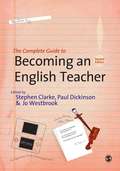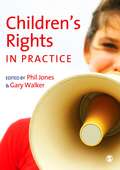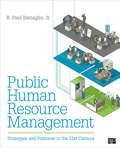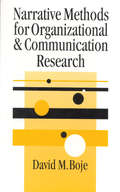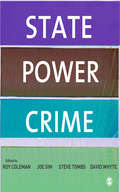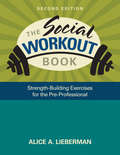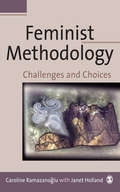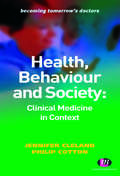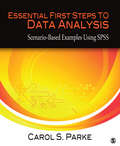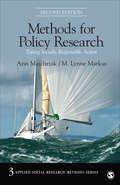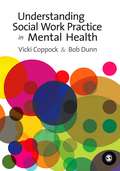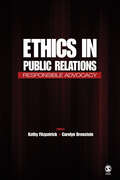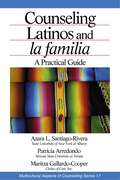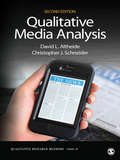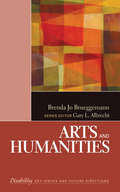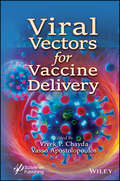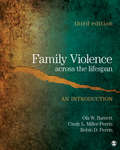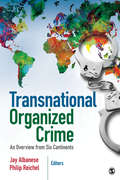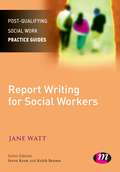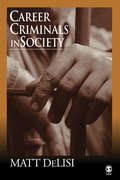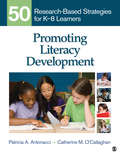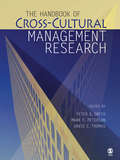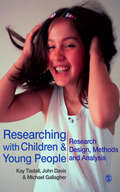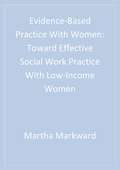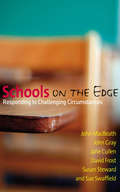- Table View
- List View
The Complete Guide to Becoming an English Teacher
by Stephen Clarke Paul Dickinson Jo WestbrookPraise for the previous edition: ′This is a text that should accompany every student teacher of English and find its way on to the shelf of all practising teachers. This book excited me. It is written in a style that makes you want to try out activities and take up challenges. This book will encourage the student teacher to embrace the subject of English along with its associated values and debates′ - ESCalate `If I was training to teach English today, this is the book I would want - an extraordinarily professional handbook of good practice ′ - Geoff Barton, Times Educational Supplement, Teacher Magazine This essential companion for aspiring secondary English teachers has been extensively reworked to help students meet the very latest professional and academic standards, while also equipping them with the knowledge and skills they will need for the beginning of their teaching career. Focusing on the essentials needed to be a successful English teacher, the authors combine subject knowledge with ideas, examples and approaches for creating an effective, vibrant learning environment, and real examples of lesson plans and schemes of work. Each chapter clearly links practice to theoretical and critical perspectives on teaching, making this an ideal text for students working towards M-level credits or a Masters in Teaching and Learning. There are also brand new chapters which explore in greater depth specific areas of contention and challenging issues, including: - Diversities, including global perspectives on teaching English - The application and implications of using ICT - Multi-agency provision in personalising learning - Research methodologies - Transition from the training year and the first year as a teacher The latest requirements for Qualified Teacher Status are clearly signposted throughout, and activities at the end of each chapter help to reinforce knowledge and encourage reflection. Written by a team of highly respected authors, this new edition should be on every secondary English student′s bookshelf.
Children′s Rights in Practice
by Phil Jones Gary WalkerConsidering the rights of the child is now central to all fields involving children and to good multi-agency working. This book offers an explanation of the theoretical issues and the key policy developments that are crucial to all professions, and helps the reader to understand children′s rights in relation to their role in working with children and young people. Looking at education, health, social care and welfare, it bridges the gap between policy and practice for children from Birth to 19 years. Chapters cover: - the child′s right to play - youth justice and children′s rights - the voice of the child - ethical dilemmas in different contexts - involvement, participation and decision making - safeguarding and child protection - social justice and exclusion This book helps the reader understand what constitutes good practice, whilst considering the advantages and tensions involved in working across disciplines to implement children′s rights against a complex legislative and social policy backdrop. Essential reading for undergraduate and graduate students on Early Years, Early Childhood Studies, Childhood and Youth, Education, Law, Social Work, Play and Psychology courses, it is relevant to professionals working across education, health and social work.
Public Human Resource Management: Strategies and Practices in the 21st Century
by Randy Paul BattaglioPublic Human Resource Management: Strategies and Practices in the 21st Century offers a novel take on public human resource management (PHRM) by providing practical guidance for practitioners operating in a drastically reformed HR environment. A comprehensive introduction to contemporary public HR management, this text incorporates analysis of the impact of the private sector-oriented reforms over the last few decades that have aimed to bring greater efficiency and productivity to the public sector. Reviewing foundational topics like recruitment and retention, pay and benefits, equal employment opportunity, and performance appraisal in light of five key reforms (decentralization, deregulation, declassification, privatization, and performance-based pay), author R. Paul Battaglio assesses how the traditional practice of public HR has changed—and not necessarily for the better. New material on human resource information systems, managing motivation in the public sector, and public HR management education is included — a topic rarely found in contemporary PHRM texts. Public Human Resource Management is an essential guide to public HR management and navigating the challenges and opportunities posed in the changing landscape of HR reform.
Narrative Methods for Organizational & Communication Research (SAGE series in Management Research)
by David Boje`The book is a unique and excellent introduction to postmodern narrative analyses′ - Organization Studies `[This book] should succeed in putting the metaphorical cat amongst just about every metaphorical pigeon that might imaginably take flight within the organization and communication research arenas. Story time will never be the same again, nor will interpretative research′ - Stewart Clegg, University of Technology, Sydney `Timely and first rate. It nicely stretches a reader′s thinking about the topic′ - Thomas Lee, University of Washington, School of Business `David Boje is a pioneering theorist in organization studies and management... [His book] is yet another example of Boje′s pioneering spirit and concern for exactitude. [His] scholarly account of narrative and antenarrative methods is both corrective and exploratory of how stories must be understood in terms of their own internal dynamics, and not viewed as static entities. Boje′s book is a magnificent start... A book that breaks new ground in organizational analysis, this is a must-read for researchers and practitioners in the fields of organization and management studies′ - Adrian Carr, University of Western Sydney `Boje masterfully shows how to analyze texts and ideas before they are reduced and fitted into the dominant ideological frameworks of the day. [He] provides a powerful tool for achieving greater democracy in how we approach doing social science... [and] liberates our capacity to make meanings for ourselves′ - Paul Hirsch, Northwestern University, Kellogg Graduate School of Management `This is an important book. It is a major methodological contribution to critical, postmodern studies of organizations and management. It is essential reading for critical management scholars′ - Robert P. Gephart, Jr., University of Alberta School of Business `David Boje has emerged as the leading postmodern thinker in management theory and organization science. His prolific output lights the path for others to follow in a field awakening to the challenge of postmodern critical theory. Updating and revising narrative theory for the prevailing "postmodern condition," Boje masterfully reconstructs the concepts and methods of storytelling, as he subverts the dominant principles of modernist organization theory. He offers a subtle and complex notion of narrative... This impressive book should leave an indelible mark on management and organization studies′ - Steven Best, University of Texas, El Paso An essential guide for academics and researchers needing to look at alternative discourse analysis strategies. As a research tool, narrative methods have become increasingly useful in organization studies, where much research involves the interpretation of ′stories′ in some form. This methodology can be applied where qualitative story analyses can help to assess interview, newspaper or web document stories for research projects. In this book, Boje sets out eight analysis options that can deal with storytelling, recognizing that stories in organizations can be self-destructing, flowing, networking and not at all static. In so doing, he shows ways in which narrative methods can be supplemented by ′antenarrative′ methods, where fragmented and collective storytelling can be interpreted. A valuable resource that will be widely used in organizational or communications research, for graduate level qualitative methods seminars and by researchers wanting to do story analysis. David Boje is Professor at the New Mexico State University. He is also on the editorial board of the journal Organization.
State, Power, Crime
by David Whyte Joe Sim Roy Coleman Steve Tombs′Following the outstanding introduction by the authors there are fifteen excellent original articles devoted to an integrated theory of the relationship between the state and crime. This work is on the cutting edge of critical criminology. It is a must read.′ - William J. Chambliss, Professor of Sociology, The George Washington University, USA. ′This book is a superb compilation of original papers by an impressive roster of authors. While the articles cover a wide range of empirical issues, from Northern Ireland and corporate crime to youth crime and heterosexual hegemony they all explore the implications, strategies and mechanisms of state power. There isn′t a weak paper here: all are extensively documented, well written, persuasive and scholarly in the very best sense.′ - Professor Laureen Snider, Queens University, Canada ′State, Power, Crime is a hugely important book for these times. Bringing together some of the most original minds in criminology it offers a critical analysis of the state, how it constructs crime, responds to it and, at times, engages in the very same. The book is essential reading for anyone interested in justice, freedom and equality.′ - Paddy Rawlinson, London School of Economics Featuring contributions by many of the leading scholars in the field, this seminal text explores the key themes and debates on state power today, in relation to crime and social order. It critically evaluates a range of substantive areas of criminological concern, including terrorism, surveillance, violence and the media. State, Power, Crime provides: "historical overviews of key theories about state power " assessment of the relationship between crime, criminal justice and the state " analysis of the development of law and order policy " discussion of the impact of structural fissures such as gender, race and sexuality " an overview of current research and writing " critical reflection on the future direction of research and analysis " advice on further reading. In 1978, with the publication of Hall et al′s Policing the Crisis and Poulantzas′s State, Power, Socialism, the complexity of the state′s interventions in maintaining a capitalist social order were laid bare for critical criminological analysis. State, Power, Crime offers an up-to-date and comprehensive examination of the challenges posed by state power, in relation to both criminal and social justice.
The Social Workout Book: Strength-Building Exercises for the Pre-Professional
by Alice A. LiebermanThe social work profession comes alive with active learning exercises!This Second Edition engages introductory social work students in hands-on, collaborative exercises focusing on four key areas in the curriculum: Social Welfare (History, Politics, Policies, and Services); The Social Work Profession; The Practice of Social Work; and A Vision for the Future. Throughout, this workbook challenges students to form their own opinions on many heated debates within key topics and helps them to apply key concepts and theories, creating enthusiasm about the field while helping to develop critical thinking skills.
Feminist Methodology: Challenges and Choices
by Janet Holland Caroline Ramazanoglu`An accessible, clearly explained review of difficult concepts within this arena as well as relevant debates. Its strengths are in outlining possible considerations that need to be taken into account when making methodological choices. It also clearly explains how these choices impact knowledge production. This book would undoubtedly be of considerable use to anyone seeking to understand and get to grips with feminist methodological issues′ - Feminism and Psychology Who would be a feminist now? Contemporary ′political realism′ suggests that the essentials of the battle have already been won, and the current generation of women entering University is used to seeing feminism presented as ′old fashioned′, ′extreme′ and ′unrealistic′. Challenging such assumptions, this important new book argues for the value of empirical investigations of gendered life, and brings together the theoretical, political and practical aspects of feminist methodology. Feminist Methodology - demonstrates how feminist approaches to methodology engage with debates in western philosophy to raise critical questions about knowledge production - shows that feminist methodology has a distinctive place in social research - guides the reader through the terrain of feminist methodology and clarifies how feminists can claim knowledge of gendered social existence - connects abstract issues of theory with issues in fieldwork practice. This timely and accessible book will be an essential resource for students in women′s studies, gender studies, sociology, cultural studies, social anthropology and feminist psychology.
Health, Behaviour and Society: Clinical Medicine In Context (Becoming Tomorrow′s Doctors Series)
by Jennifer Cleland Philip Cotton Jennifer Cleland, Philip CottonThere is more to a person than a particular symptom or disease: patients are individuals but they are not isolated, they are part of a family, a community, an environment, and all these factors can affect in many different ways how they manage health and illness. This book provides an introduction to population, sociological and psychological influences on health and delivery of healthcare in the UK and will equip today’s medical students with the knowledge required to be properly prepared for clinical practice in accordance with the outcomes of Tomorrow’s Doctors.
Essential First Steps to Data Analysis: Scenario-Based Examples Using SPSS
by Carol S. ParkeCarol S. Parke′s Essential First Steps to Data Analysis: Scenario-Based Examples Using SPSS provides instruction and guidance on preparing quantitative data sets prior to answering a study′s research questions. Such preparation may involve data management and manipulation tasks, data organization, structural changes to the data files, or conducting preliminary analysis. Twelve research-based scenarios are used to present the content. Each scenario tells the "story" of a researcher who thoroughly examined their data and the decisions they made along the way. The scenario begins with a description of the researcher′s study and his/her data file(s), then describes the issues the researcher must address, explains why they are important, shows how SPSS was used to address the issues and prepare data, and shares the researcher′s reflections and any additional decision-making. Finally, each scenario ends with the researcher′s written summary of the procedures and outcomes from the initial data preparation or analysis.
Methods for Policy Research: Taking Socially Responsible Action (Applied Social Research Methods)
by Ann Majchrzak M. Lynne MarkusThis book about responsible and evidence-based decision making is written for those interested in improving the decisions that affect people’s lives. It describes how to define policy research questions so that evidence can be applied to them, how to find and synthesize existing evidence, how to generate new evidence if needed, how to make acceptable recommendations that can solve policy problems without negative side effects, and how to describe evidence and recommendations in a manner that changes minds. Policies are not just the decisions made by a country’s rulers or elected officials; policies are also set by corporate executives, managers of department stores, and project leaders in non-profit organizations pursuing environmental protection. The authors’ suggestion are based on the fundamental belief that evidence-based decision making is superior to decisions based purely on opinion, intuition, and emotion. Because much has happened since 1984 when the first edition was published, this is a substantially different book with a new co-author, new and updated examples, new chapters, and new frameworks for understanding.
Understanding Social Work Practice in Mental Health
by Victoria Coppock R. W. Dunn′An excellent introduction to the main themes of social work and mental health. It provides a comprehensive summary of contemporary debates and perspectives around mental health practice. I would recommend this to all social work students.′ - Philip O′Hare, University of Central Lancashire "This book is a timely restatement of the central role of social work in mental health. In this important work, Coppock and Dunn have developed a well written and closely argued case for retaining social work skills as a key part of a truly integrated mental health system." - Terry Bamford, Director, Social Perspectives Network This book provides an authoritative overview of mental health theory, policy and practice. Exploring the complex moral and ethical dimensions underpinning the field, the book engages with the key issues encountered by practitioners working in the modern mental health system. Using real world scenarios, case studies, and reflective exercises, it asks students to critically examine the world of mental health practice from the perspective of users of mental health services and their carers. Reflecting the core values, skills and knowledge frameworks required for professional social work qualification in the mental health context, this book will enable students to: - Understand mental health theory and practice as a contested arena. - Recognise professional differences and inter-professional strengths. - Tolerate uncertainty and complexity in practice. - Develop critically as reflexive mental health practitioners. Included in the text are practice dilemmas, chapter summaries, and resources to aid further study.
Ethics in Public Relations: Responsible Advocacy
by Kathy Fitzpatrick & Carolyn Bronstein"This is an intelligent book about serious issues in public relations: accountability, responsibility, transparency, loyalty, truthtelling, and fairness. It should be required reading in boardrooms, in PR classrooms, and at the Pentagon." - Jay Black, Editor, Journal of Mass Media Ethics "Ethics in Public Relations fills an important need at a time when the credibility of public relations (and some public relations practitioners and public relations firms) is under attack. In a manner that is never preachy or dogmatic, Fitzpatrick and Bronstein have put together a series of essays that have application across the public relations spectrum. They are sure to be informative and instructive both to long-time professionals and candidates for entry-level positions." - Harold Burson, Founding Chairman, Burson Marstellar "This book is both highly readable and long overdue. Fitzpatrick and Bronstein have produced a thoughtful, thorough, and very practical look at the ethical dimensions of public relations, not just in theory, but in everyday practice. The essays are sharp, witty, on-point and highly pragmatic. Their examples are relevant, their anecdotes purposeful. Given the state of the profession these days, it′s difficult to see how students of public relations could call themselves current without first reading this smart collection of essays." - James S. O′Rourke IV, Professor and Director, The Eugene D. Fanning Center for Business Communication, University of Notre Dame "Fitzpatrick and Bronstein have for every public relations professional established a foundation to practice advocacy ethically. Practice settings may change, but Fitzpatrick and Bronstein demonstrate that the individual professional has an ongoing ethical imperative to advocate responsibly. Fitzpatrick′s discussion of the PRSA Code of Ethics concept of advocacy (which she helped draft) breaks new and helpful ground, bringing clarity and substance to this crucial ingredient of most public relations practice." - James E. Lukaszewski, Chairman and President, The Lukaszewski Group Inc. Ethics in Public Relations: Responsible Advocacy is the first book to identify universal principles of responsible advocacy in public relations. In this engaging book, editors Kathy Fitzpatrick and Carolyn Bronstein bring together prominent authorities in the field to address theoretic and practical issues that illustrate the broad scope and complexity of responsible advocacy in 21st-century public relations. The collection explores such matters as the fragile line between ethical and legal public relations practices, ethical challenges in building relationships with increasingly diverse publics, the requirements of ethical advocacy online, ethical accountability in organizational settings, the special ethical obligations of nonprofit groups, and ethical mandates in cross-border public relations.
Counseling Latinos and la familia: A Practical Guide (Multicultural Aspects of Counseling series)
by Maritza Gallardo-Cooper Patricia Arrendondo Azara L. Santiago-RiveraCounseling Latinos and la familia provides an integrated approach to understanding Latino families and increasing competency for counselors and other mental health professional who work with Latinos and their families. It provides essential background information about the Latino population and the family unit, which is so central to Latino culture, including the diversity of various Spanish-speaking groups, socio-political issues, and changing family forms. The book also includes practical counseling strategies, focusing on the multicultural competencies approach.
Qualitative Media Analysis (Qualitative Research Methods)
by David L. Altheide Christopher J. SchneiderIn order to prepare a successful research project, a qualitative researcher often must consult media documents of various types. Authors David L. Altheide and Christopher J. Schneider show readers how to obtain, categorize, and analyze these different media documents in this entry in the Qualitative Research Methods series. They look at traditional primary documents such as newspapers and magazines but also at more recent forms--television newscasts and cyberspace. The use of student examples of research protocols makes this book a useful primer in deriving meaning from the bombardment of media documents a qualitative researcher faces.
Arts and Humanities (The SAGE Reference Series on Disability: Key Issues and Future Directions)
by Brenda Jo BrueggemannThis volume in The SAGE Reference Series on Disability explores the arts and humanities within the lives of people with disabilities. It is one of eight volumes in the cross-disciplinary and issues-based series, which incorporates links from varied fields making up Disability Studies as volumes examine topics central to the lives of individuals with disabilities and their families. With a balance of history, theory, research, and application, specialists set out the findings and implications of research and practice for others whose current or future work involves the care and/or study of those with disabilities, as well as for the disabled themselves. The presentational style (concise and engaging) emphasizes accessibility. Taken individually, each volume sets out the fundamentals of the topic it addresses, accompanied by compiled data and statistics, recommended further readings, a guide to organizations and associations, and other annotated resources, thus providing the ideal introductory platform and gateway for further study. Taken together, the series represents both a survey of major disability issues and a guide to new directions and trends and contemporary resources in the field as a whole.
Viral Vectors for Vaccine Delivery
by Vivek Chavda Vasso ApostolopoulosThe book is essential for anyone interested in vaccine development, as it highlights the unique advantages of viral vector vaccines in triggering robust, long-lasting immunity and provides an in-depth exploration of the technology and advancements shaping the future of healthcare. Viral vector vaccines have several unique advantages when compared to other vaccine platforms. These powerful vaccines are capable of triggering long-lasting cellular responses, such as cytotoxic T-lymphocytes, that eradicate virus-infected cells. Viral vector-based vaccines use a harmless virus to smuggle the instructions for making antigens from the disease-causing virus into cells, triggering protective immunity against them. In contrast to conventional antigen-containing vaccines, these vaccines use the body’s natural defense system to produce antigens by using a modified virus to deliver genetic code for an antigen. Viral Vectors for Vaccine Delivery provides a comprehensive overview of viral vectors and their applications in vaccine delivery. Its chapters explore various aspects of viral vector technology, from the basic principles of viral vector construction to the latest advancements in gene editing and manufacturing. Readers will find that the book Offers a deep dive into the world of viral vectors, covering their principles, applications, and potential impact on healthcare; Explores how viral vectors are revolutionizing vaccine development, providing a more effective and targeted approach to disease prevention; Discusses the potential of viral vectors to address emerging health challenges and contribute to a healthier world. Audience Research scholars, pharma-process engineers, research scientists, pharmacy students and professionals from the pharmaceutical and biopharmaceutical industry interested in drug discovery, chemical biology, computational chemistry, medicinal chemistry, and bioinformatics
Family Violence Across the Lifespan: An Introduction
by Robin D. Perrin Ola W. Barnett Cindy L. Miller-PerrinThe most comprehensive research-based text on family violence – now more accessible and visually inviting than ever before Streamlined and updated throughout with state-of-the-art information, this Third Edition of the authors′ bestselling book gives readers an accessible introduction to the methodology, etiology, prevalence, treatment, and prevention of family violence. Research from experts in the fields of psychology, sociology, criminology, and social welfare informs the book′s broad coverage of current viewpoints and debates within the field. Organized chronologically, chapters cover child physical, sexual, and emotional abuse; abused and abusive adolescents; courtship violence and date rape; spouse abuse, battered women, and batterers; and elder abuse.
Transnational Organized Crime: An Overview from Six Continents
by Philip Reichel Jay AlbaneseThis unique text explores the expansive topic of transnational organized crime, incorporating expert perspectives found throughout the world’s six inhabited continents: North America, Central and South America, Europe, Africa, Asia, and Oceania. Editors Jay S. Albanese and Philip L. Reichel gather the knowledge and expertise of numerous authors, researchers, and practitioners in this field who are either native to each world region, have extensively travelled and worked there, or are recognized scholars for those regions. Through this text, readers will begin to understand the geographic, cultural, and regional similarities and differences underying the common threat of transnational organized crime, as well as how to address the global expansion of organized crime today.
Report Writing for Social Workers (Post-Qualifying Social Work Practice Guides)
by Jane WattMany students and qualified workers in all areas of social work feel apprehension at the prospect of writing a formal report for a court or tribunal. Writing may be a fundamental skill, but it is one that students and practitioners cannot afford to take for granted. Recent reviews (Baby P, Serious Case Review processes) highlighted the need for clear reports, recording and written communication between professionals. This practical and accessible textbook presents the report writing process in a clear and straightforward way. From methods of collecting and presenting evidence, to drawing conclusions and writing up a final report.
Career Criminals in Society
by Matt DeLisiMore than a century of scientific research has indicated that the majority of crime that occurs in society is committed by a small percentage of the population, meaning that most criminals are repeat offenders, or "career criminals." If societies devoted considerable resources toward preventing and neutralizing career criminals, there would be dramatic reductions in crime, the fear of crime, and the assorted costs and collateral consequences of crime. Career Criminals in Society examines the small but dangerous group of repeat offenders who are most damaging to society. The book encourages readers to think critically about the causes of criminal behavior and the potential of the criminal justice system to reduce crime. Author Matt DeLisi draws upon his own practitioner experience, interviewing criminal defendants to argue that career criminals can be combated only with a combination of prevention efforts and retributive criminal justice system policies. Key FeaturesUses an engaging writing style to provide a comprehensive overview of career criminalsProvides chapter-opening vignettes developed from real criminal casesExamines various crime prevention strategies to neutralize criminal careers Explores the international relevance of career criminalsDraws upon research from the fields of criminal justice, criminology, psychology, sociology, and human developmentWith its controversial, thought-provoking style, Career Criminals in Society is sure to advance theory and research on chronic offenders and inspire discussions on how to adequately control crime. It is an excellent supplementary textbook for undergraduate and graduate courses on criminology, criminal behavior, crime typologies, deviant behavior, and crime control and prevention.
Promoting Literacy Development: 50 Research-Based Strategies for K-8 Learners
by Patricia A. Antonacci Catherine M. O′CallaghanFifty research-based literacy strategies designed for busy K-8 classroom teachersOrganized around 10 key areas for teaching and learning literacy—phonemic awareness, phonics, reading fluency, vocabulary, story comprehension, comprehension of informational text, questioning for understanding, discussion for understanding, narrative writing, and writing to learn-Promoting Literacy Development offers 50 clearly written, step-by-step strategies for developing proficient readers and writers. The authors also include suggestions for differentiating instruction for English language learners and for students with special needs.
The Handbook of Cross-Cultural Management Research
by David C. Thomas Mark F. Peterson Peter B SmithRenowned international experts Peter B. Smith, Mark F. Peterson, and David C. Thomas, editors of the The Handbook of Cross-Cultural Management, have drawn together scholars in the field of management from around the world to contribute vital information from their cross-national studies to this innovative, comprehensive tome. Chapters explore links between people and organizations, providing useful cultural perspectives on the most significant topics in the field of organizational behavior—such as motivation, human resource management, and leadership —and answering many of the field′s most controversial methodological questions. Key Features Presents innovative perspectives on the cultural context of organizations: In addition to straightforward coverage of structures and processes, this Handbook addresses locally distinctive, indigenous views of organizational processes from around the world and considers the interplay of climate and wealth when analyzing how organizations operate. Offers an integrated theoretical framework: At the start of each substantive section, the Editors provide context for the upcoming chapters by discussing how prevalent cultures in different parts of the world place emphasis on particular aspects of organizational processes and outcomes. Boasts a global group of contributing scholars: This Handbook features contributing authors from around the world who represent an outstanding mix of respected, long-standing scholars in cross-cultural management as well as newer names already impacting the literature. Provides an authoritative agenda for the future development of the field: All chapters conclude with a list of promising avenues for further research and a focus on issues that remain unresolved.Intended AudienceThis Handbook is an ideal resource for researchers, instructors, professionals, and graduate students in fields of business, management, and psychology.
Researching with Children and Young People: Research Design, Methods and Analysis
by Michael Gallagher John Emmeus Davis E Kay Tisdall′This text will be of great use to postgraduate researchers in education, social work and nursing, and any practitioner involved in carrying out research with children and young people′ - CPD Update ′[T]here is a sense of newness and innovation about the book, whereby the reader is treated to insight into the life and work of collaborators who wrote each case study....[T]he book is highly accessible for students at graduate and undergraduate level, for example BA (Hons) Early Childhood Studies students′ - ESCalate Researching with Children and Young People covers every stage of the process of doing a research project, from research design and data collection, through to analysis and writing up. The book is divided into three sections, in which the authors cover: - Introducing research and consultation with children and young people - Collecting and analysing data - Whole-project issues. Each chapter includes activities, discussion questions, tips and extended case studies to help the reader to engage with the material and investigate the practical implications. This text will be of great use to postgraduate researchers in education, social work and nursing, and any practitioner involved in carrying out research with children and young people.
Evidence-Based Practice With Women: Toward Effective Social Work Practice With Low-Income Women (Evidence-Based Practice in Social Work)
by Bonnie L. Yegidis Martha J. MarkwardThe first book to focus on evidence-based social work practice with low-income womenThis one-of-a-kind book presents evidence-based coverage of the assessment and treatment of the most common mental health disorders among women, particularly low-income women. For each disorder— depression, post-traumatic stress disorder and trauma (including sexual abuse), generalized anxiety disorder, substance use disorder, and borderline personality disorder—the authors include assessment instruments and detailed case examples that illustrate the assessment and treatment recommendations.
Schools on the Edge: Responding to Challenging Circumstances
by David Frost Sue Swaffield Susan Steward Jane Cullen John M Gray John MacBeath′An ideal text for challenging the thinking of those studying for NPQH… The conclusion by the authors suggests nine major points to consider if improvement for schools in extremely challenging circumstances is to happen and be sustained. These ′nine lesson for policy makers′ are very frank and pertinent points, let′s hope at least some of our policy makers read them!′ - ESCalate ′Rarely does a book on education reform capture both the big and the small picture with such brilliant clarity. MacBeath and his colleagues furnish a ′no holds barred′ account of the ins and outs of understanding and assessing the impact of schools struggling for success. A fascinating read′ - Michael Fullan, Professor Emeritus, OISE/University of Toronto Schools serving young people on the margins of society face a major challenge in trying to create an environment where students can succeed. The book examines key issues in the field of school improvement. More specifically, it draws on evidence from the SFECC (Schools Facing Exceptionally Challenging Circumstances) project to explore: o the policy context of schools on the edge o the nature of extreme challenges o the way schools have responded to extreme challenge o what seems to be effective in helping such schools to meet the challenge o obstacles to success and the facilities and resources that can make a difference o strategies to meet the needs of the local community and facilitate lasting change. Each of the authors has wide experience of school effectiveness and improvement, and of working with schools in disadvantaged communities in Britain, the USA and many other parts of the world. School leaders, local authorities, practitioners and all those involved in any aspect of school leadership and school improvement will find this book highly pertinent.
